- Home
- Block, Lawrence
Manual For Fiction Writers
Manual For Fiction Writers Read online
Contents
1. SETTING YOUR SIGHTS
How to discover your options as a writer. Using your reading preferences as a selection mechanism. Deciding what to write via identification with another writer.
2. STUDYING THE MARKET
The mechanics of market analysis. Reading with a purpose. Defining a category through plot summaries. How to write stories that are the-same-only-different.
3. DECISIONS, DECISIONS
The question of slanting for an editor's taste. How to maintain integrity as a writer without making things hard for yourself. The Stepmother?a case study in decision-making.
4. NOVEL APPROACHES
The disadvantages of short fiction. Why not write a novel? Plots and outlines. The first novel as a learning experience.
5. NOTHING SHORT OF NOVEL
A further discussion of the book-length work of fiction. The power of writing one page a day. Overcoming fear of failure. More questions and answers on the novel.
6. SUNDAY WRITERS
Writing as an avocation. Is eventual publication essential for success? The special rewards of unpublished fiction.
7. DEAR JOY
Advice to a college writer. What courses to take. The values and limitations of writing classes. Sidelines and extracurricular activities. Becoming a pro.
8. HOW TO READ LIKE A WRITER
How writing improves one's reading. Mental rewriting as a literary exercise. Improving your writing skills through analytical reading.
9. ROLLING WITH THE PUNCHES
How to handle rejection. The importance of submitting manuscripts relentlessly. Rejection as a part of the process of writing. What it does and doesn't mean to you.
10. BIC, SCRIPTO, PARKER AND CROSS
The uses and abuses of pen names. Six reasons to use a pen name. Why not to use a pen name. Making your own choice.
11. WRITING WITH TWO HEADS
Teaming up with a collaborator. Collaboration vs. ghostwriting. Five times the work for half the money. The joys of collaboration. How different author teams work together.
12. IT TAKES MORE THAN TALENT
Other requirements for writing success. The importance of luck. The role of the will. The one-book author. Living with financial insecurity. You have to like the work.
PART TWO NOSE TO THE GRINDSTONE, SHOULDER TO THE WHEEL: Fiction as a Discipline
13. WRITER'S HOURS
Do writers work all the time? Writing, research and the guilt trap. Knowing when enough is enough. Starting early. Working regularly. Postponing routine work.
14. THE CARROT AND THE STICK
The art of self-discipline. Giving writing top priority. Setting goals for yourself. Staying in the now. Getting the job done. Listen, it's only a book.
15. CREATIVE PROCRASTINATION
Coming to terms with the thief of time. Developing fictional ideas through procrastination. Creative use of the back burner. And Miles to Go Before I Sleep?a case study in Creative Procrastination.
16. TIME OUT
Writer's block and creative sloth. Coping with indolence. What to do when the words won't come. Learning to regard stretches of inactivity as part of the creative process.
17. DO IT ANYWAY
What to do when the words have to come. Giving yourself permission to write badly. Learning to override your own critical instincts. Getting through bad patches.
18. F U CN RD THS
Writing faster without sacrificing quality. Fast writers vs. slow writers. How to find your own natural speed.
19. WASHING GARBAGE
The pleasures and pains of rewriting. How revision can drain a story of its freshness. How to minimize the need for extensive revision. Rewriting as you go along. Doing mental first drafts.
20. ON BEING READ
The importance of sharing your work with others. Making use of readers' reactions. Why fellow writers make the best audience. Ways to avoid disappointment.
21. BURNING THE RAFT AT BOTH ENDS
How to keep having something to write about. The relationship of input and output. Remaining open to new experience. Four ways to stay out of ruts.
22. CREATIVE PLAGIARISM
When stealing is legitimate?and when it isn't. Improving on what you read. Working variations on a theme. The Ehrengraf Defense?a case study in Creative Plagiarism.
23. WHERE DO YOU GET YOUR IDEAS?
How to generate fictional ideas. Putting bits of fact together. Getting ideas from writers and publishers. The hazards of other people's ideas. Harnessing the creative power of your own frustrations.
PART THREE OH, WHAT A TANGLED WEB: Fiction as a Structure
24. OPENING REMARKS
The importance of strong openings. Getting the story moving. Setting the tone. Establishing the problem. How to get your story off to a good start.
25. FIRST THINGS SECOND
The trick of not beginning at the beginning. Switching Chapters 1 and 2. When not to use this approach. Case studies.
26. SPRING FORWARD, FALL BACK
Skipping around in time. Taking a stitch in time in transitions. The art of starting in the middle. Mini-flashbacks.
27. DON'T TAKE THE D TRAIN
How to avoid getting bogged down in detail. The perils of over-explaining. Fast cuts?the difference between film and prose.
28. THE I'S HAVE IT
Traditional warnings against writing in the first person. The special advantages of first-person narration. Its strengths as an aid in characterization and identification. Withholding information from the reader.
29. THE PLOT'S THE THING
The central importance of plot. Distinguishing between plot and idea. Last Wishes?a case study in plotting.
30. NO MORE MR. NICE GUY
The necessity of strong character motivation. Why it cannot be taken for granted. Motivating your characters through strong plot development. Wilderness?a case study in effective motivation.
31. THINK YOU'VE GOT PROBLEMS?
The problem as the core of a plot. Making things hard for your hero. How to be your own worst enemy. The perils of icebox thinking. When to bring in a bear in a canoe.
32. JUDGING DISTANCES
How to draw the reader in close. Some reasons to keep him at arm's length. First names vs. last names. Using a Watson. Regulating distance through dialogue.
33. IT'S A FRAME
The frame device as a distancing mechanism. Adding dimension to a story through a frame. The story within a story.
34. DOCUMENTARY EVIDENCE
Telling a story in letters or diary entries. Early examples of documentary fiction. The possibilities of verisimilitude.
35. SURPRISE!
The value of surprise endings. Why some work while others don't. Withholding information from the reader. Surprises that fall flat. Surprise endings that give a story a whole new perspective.
PART FOUR ONE DAMNED WORD AFTER ANOTHER: Fiction as a Craft
36. NEVER APOLOGIZE, NEVER EXPLAIN
The perils of explaining too much. The author as stage director. How to get out of the way. When to keep the reader in the dark. The reader's role in fiction.
37. HE SAID SHE SAID
Letting dialogue stand alone. Adding verbs for accent value. Alternatives to said. Special options in first-person narration. The rules and when to break them.
38. VERBS FOR VIM AND VIGOR
Strengthening your prose with stronger verbs. Stiff Upper Lip, Jeeves?a case study in imaginative verb use. The Sour Lemon Score?a case study in vivid action verbs.
39. MODIFIERS FOR MOOD-SWING
Minimizing modifiers to create lean prose. Adding them to sharpen the focus. Factual vs. judgmental modifi
ers. Avoiding empty adjectives. Moby Dick?a case study in the use of adjectives.
40. WRITING WITH YOUR EYES CLOSED
How to enhance your scenes by visualizing them. Some exercises to develop visualization techniques. Suspending your own disbelief.
41. HUM A FEW BARS-AND FAKE IT
Shortcuts to time-consuming research. Faking locations. Feigning expertise. How not to overdo it. The importance of details.
42. CHARACTER BUILDING
Creating plausible, sympathetic, and original characters. Character vs. character tags. Drawing upon one's own self. Matthew Scudder?a case study in characterization.
43. CASTING
Creating memorable minor characters and bit players. Highlighting character vs. caricature. Casting as an aid to plot development.
44. NAME CALLING
How to pick apt and memorable names for your characters. Avoiding confusion. Keeping a notebook. Watching out for cuteness. Shortcuts in research.
45. REPEAT PERFORMANCES AND RETURN ENGAGEMENTS
Special problems in creating and developing a series character. Writing a series one book at a time. How to keep from going stale. Letting a character grow and evolve.
46. WE CAN ALWAYS CHANGE THE TITLE
What makes a good title? Coming up with memorable titles. Titles that fit their stories. Using your imagination. How titles get changed.
PART FIVE ISN'T THAT THE TRUTH: Fiction as a Spiritual Exercise
47. A WRITER'S PRAYER
INTRODUCTION
by Sue Grafton
SO HERE'S how this went. I was struggling with the storyline for K is for Killer, which had just about wrestled me to a standstill. I knew it was time to launch into the first chapter, but my psyche was reacting. I'd spent the day half-sick, staggering from my bed to the word processor and back. Nothing seemed to work. I knew the illness was stress-induced, but the symptoms were sufficient to muddy my thinking. I tried an opening or two, but I couldn't hit a vein. Naturally, I did what any sensible writer in my position would do. I went out to the mailbox. There, among the fascinating personal messages addressed to OR CURRENT RESIDENT, was a letter from Lawrence Block indicating that Morrow would be publishing a new edition of Telling Lies for Fun and Profit and asking if I'd contribute the introduction. Thrilled at so legitimate a reason to avoid my work, I went back to my office and plucked my well-worn copy from the shelf. I began to leaf through the pages, purely with an eye to preparing this foreword. Soon, I was sprawled in a comfy chair reading every chapter in sequence. Midway, I sat up, amazed to find that in the chapter called Opening Remarks, Lawrence Block had written about the very frustration I was experiencing with K. Furthermore, his advice about openings was right on the money. I set the book aside and went back to my word processor, looking at my problem with renewed interest and a tiny flicker of hope. I began to pick my way through the rubble, and suddenly I found myself in business again.
I knew Lawrence Block's work long before I knew the man. For many years before our first meeting, I'd been intrigued not only by his fiction, but by his advice about writing. In the early years of the Kinsey Millhone series, I made a point of reading Telling Lies for Fun and Profit before beginning each new book. I still find it essential to my peace of mind. Telling Lies for Fun and Profit is the equivalent of a house call from the family doctor. Whatever my condition, whatever the nature of my creative symptoms that day, I know I can count on a sympathetic ear and an effective remedy. Whether he's talking about plot, character motivation, point of view, or revisions, his suggestions are practical and his guidance is dependable.
I remember asking him once how he could be so generous. Every theory about writing, every trick he'd discovered, he was willing to share. Wasn't he worried about revealing trade secrets? Wasn't his advice to other writers the same as aiding and abetting his professional competition? He seemed amused by the question. So what if someone else does well? That doesn't affect me or my work. He felt that writing about his own experiences forced him to crystallize his thoughts and allowed him new insights that were invaluable to him.
In rereading Telling Lies for Fun and Profit, I've been startled to realize how many of the tenets I'd thought were my private revelations really came from him: his advice about writing to please yourself, about putting writing first; his counsel about page-count quotas as a way of fulfilling the work commitment from day to day. For years now I've been happily passing these off as my personal epiphanies, and perhaps they were; I'm sure many working writers eventually arrive at the same conclusions. But what a comfort it is to come across them in print. Reading Lawrence Block's opinions has reinforced my own. There's consolation in knowing our experiences are so similar. After all, if he has survived, then maybe I will, too.
Most valuable to me is the fact that he takes me behind the scenes, making me a part of his process, privy to the struggles he has endured over the course of his long career. He, too, has suffered resistance, bewilderment, occasional lapses in faith. He has begun and abandoned manuscripts, been blocked, given up all hope, has returned to half-finished books with puzzlement about why he broke off the writing, turning them then into some of his most accomplished published works. He's candid about his failures and refreshingly modest about his numerous successes. His wisdom, his munificence, his warmth, and his down-to-earth admonitions about the craft of fiction are the equivalent of a home-study program.
I would urge other writers, at whatever point in their careers, to take the time to read this indispensable handbook. In it, Lawrence Block addresses with humor and common sense the issues that every writer faces. His ruminations about his fictional destinations, his recognition of the myriad obstacles along the road, and his suggestions about how to cope with every aspect of the journey have made me a better traveler. Telling Lies for Fun and Profit should be a permanent part of every writer's library. Certainly, the book holds a treasured place on my shelf.
At the moment, I'm hoping another quick read will give me the solution to my current crisis. And on it goes.
Santa Barbara, California
PREFACE
IN THE summer of '75 I hit the road. I gave up my New York apartment, sold or gave away most of the possessions of a lifetime, packed the remainder into the back of a diseased station wagon, and set out for Los Angeles.
It took me about eight months to get there. I followed the coast down to Florida, then drifted west. I would linger in a spot for a couple of days or weeks, then pull up stakes on a whim. Once I checked out of a motel and drove five miles down the road because the television set at the first place wouldn't pick up a football game I wanted to watch.
During this time I continued writing. I had, after all, done virtually nothing else since college. I wrote the first draft of a novel which ultimately became Ariel. I wrote several books that withered and died after fifty or sixty pages; when I think of them now I imagine them as mummified fruit on a tainted tree.
I wrote short stories, too, something I hadn't done in years. And I wrote an article which I called Where Do You Get Your Ideas? I did a mental first draft in the car heading west from Wilmington, North Carolina, typed it the following morning in a motel room, and mailed it the next afternoon from a branch post office in Greenville, South Carolina.
And had not the slightest idea what I was getting into.
Half a year later I was living at the Magic Hotel in Hollywood. One day I remembered that article I'd sent to Writer's Digest. I'd never heard from them. I wrote, asking wha hoppen, and got a phone call in reply from WD's editor John Brady. He'd been attempting to buy the piece for months but some secretary had garbled my address and the correspondence had gone awry. We discussed a couple of changes he wanted me to make. I mentioned I'd be driving east sometime in August, and he invited me to say hello if I got within hailing distance of Cincinnati.
By August I decided Writer's Digest needed a fiction column. I made a point of stopping in Cincinnati on my way back to New York, and after a
hearty lunch continued east with an assignment to write a column every other month on the techniques of fiction. After I'd done five or six columns there was some editorial reshuffling and my column went monthly. I've been at it ever since.
Looking back, I found myself wondering what ever prompted me to write that piece on the genesis of fictional ideas in the first place. I can think of a couple of factors. I'd been deprived entirely of the company of other writers for a few months at that point, and I guess I was feeling the isolation; it must have concentrated my mind upon the nature of my work and its underlying processes. For another thing, I was writing short stories again after a long layoff, and my mind was serving up plot ideas one after the other. I found the process interesting enough to write about.
I certainly never suspected that a few pages on the development of ideas would eventually transform me into someone who spent a significant amount of his time writing about writing. But that is what has happened, and it has had interesting effects above and beyond my monthly check and the ego gratification of a regular column.
It's a commonplace in the profession that writers work twenty-four hours a day. (See Chapter 13, Writer's Hours.) I don't know about that, but I do know that my column keeps me working far more than the time I devote to its actual composition. Everything I read is potentially grist for this particular mill. Does a particular author foreshadow a coming plot development in an interesting way? Hmmm. Should I consider a column on foreshadowing as a literary device? What other examples come to mind? Examples, say, of ineffective foreshadowing as well?
Similarly, I've become more interested than ever in what other writers have to say about writing, whether they're discussing their writing methods, offering tips, or commenting upon the nature of the profession. I'm forever clipping things?and, more often than not, losing the clips.
Once or twice a year WD's capable Rose Adkins writes me a plaintive note asking for a list of my prospective column topics for the next however many months. Once or twice a year I try to make her understand that I could more easily supply maps of the far side of the moon. More often than not, I complete each column convinced I'll have to give up the job, that I'll never again be able to come up with a viable theme for a column. Somehow within the next thirty days a topic suggests itself and I find a way to approach it. I've learned to take it on faith that this will happen.

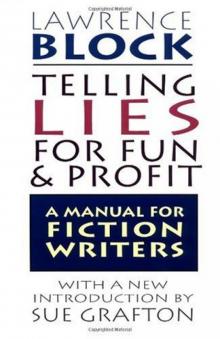 Manual For Fiction Writers
Manual For Fiction Writers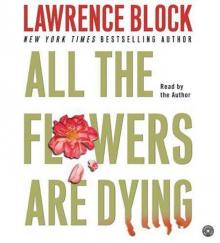 All the Flowers Are Dying
All the Flowers Are Dying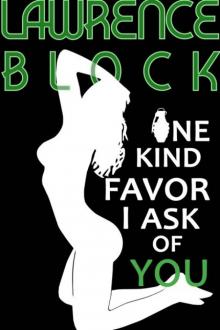 One Kind Favor I Ask of You (Kit Tolliver #8) (The Kit Tolliver Stories)
One Kind Favor I Ask of You (Kit Tolliver #8) (The Kit Tolliver Stories)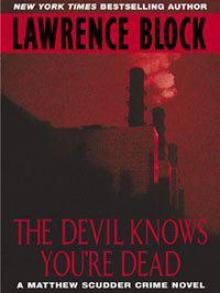 The Devil Knows You’re Dead
The Devil Knows You’re Dead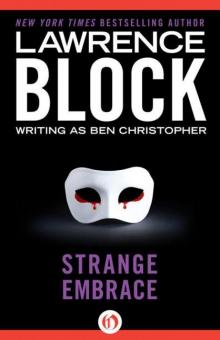 Strange Embrace
Strange Embrace Clean Slate (Kit Tolliver #4) (The Kit Tolliver Stories)
Clean Slate (Kit Tolliver #4) (The Kit Tolliver Stories)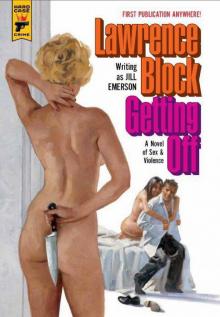 Hard Case Crime: Getting Off
Hard Case Crime: Getting Off You Can Call Me Lucky (Kit Tolliver #3) (The Kit Tolliver Stories)
You Can Call Me Lucky (Kit Tolliver #3) (The Kit Tolliver Stories) Zeroing In (Kit Tolliver #11) (The Kit Tolliver Stories)
Zeroing In (Kit Tolliver #11) (The Kit Tolliver Stories) Rude Awakening (Kit Tolliver #2) (The Kit Tolliver Stories)
Rude Awakening (Kit Tolliver #2) (The Kit Tolliver Stories) Unfinished Business (Kit Tolliver #12) (The Kit Tolliver Stories)
Unfinished Business (Kit Tolliver #12) (The Kit Tolliver Stories)